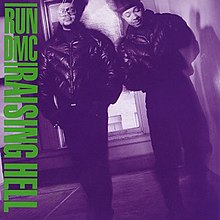Raising Hell (album)
| Raising Hell | ||||
|---|---|---|---|---|
 |
||||
| Studio album by Run–D.M.C. | ||||
| Released | May 15, 1986 (U.S.) July 14, 1986 (UK) |
|||
| Recorded | 1985-1986 | |||
| Genre | Hip hop, rap rock | |||
| Length | 39:46 | |||
| Label | Profile, Arista | |||
| Producer | Russell Simmons, Rick Rubin | |||
| Run–D.M.C. chronology | ||||
|
||||
| Singles from Raising Hell | ||||
|
||||
| Professional ratings | |
|---|---|
| Review scores | |
| Source | Rating |
| AllMusic | |
| Chicago Tribune | |
| Encyclopedia of Popular Music | |
| Pitchfork Media | 7.7/10 |
| Q | |
| Rolling Stone | |
| The Rolling Stone Album Guide | |
| Spin Alternative Record Guide | 10/10 |
| Uncut | |
| The Village Voice | A− |
Raising Hell is the third studio album by hip hop group Run–D.M.C.. The breakthrough album trumped standing perceptions of commercial viability for hip-hop groups, achieving triple-platinum status and receiving critical attention from quarters that had previously ignored hip hop, dismissing it as a fad.
Raising Hell spawned several hit singles, notably the groundbreaking rap rock version of Aerosmith's 1975 song "Walk This Way".
Raising Hell features the well-known cover "Walk This Way" featuring Steven Tyler and Joe Perry of Aerosmith. While the song was not the group's first fusion of rock and hip hop (the group's earlier singles "Rock Box" and "King of Rock" were), it was the first such fusion to make a significant impact on the charts, becoming the first rap song to crack the top 5 of The Billboard Hot 100. Raising Hell peaked at No. 1 on Billboard's Top R&B Albums chart as the first hip hop/rap album to do so, and at No. 6 on the Billboard 200.
Raising Hell was voted the fifth best album of 1986 in the Pazz & Jop, an annual poll of American critics nationwide, published by The Village Voice.Robert Christgau, the poll's creator, wrote in a contemporary review, "Without benefit of a 'Rock Box' or 'King of Rock,' this is [Run–D.M.C.'s] most uncompromising and compelling album, all hard beats and declaiming voices." Richard Cromelin was less enthusiastic in his review for the Los Angeles Times, writing that the group's style sounded somewhat repetitive and limited: "If the same old boasts are wearing thin and the misogyny gets grating, the beats are infectious and varied and the vocal trade-offs can be dazzling."
...
Wikipedia
